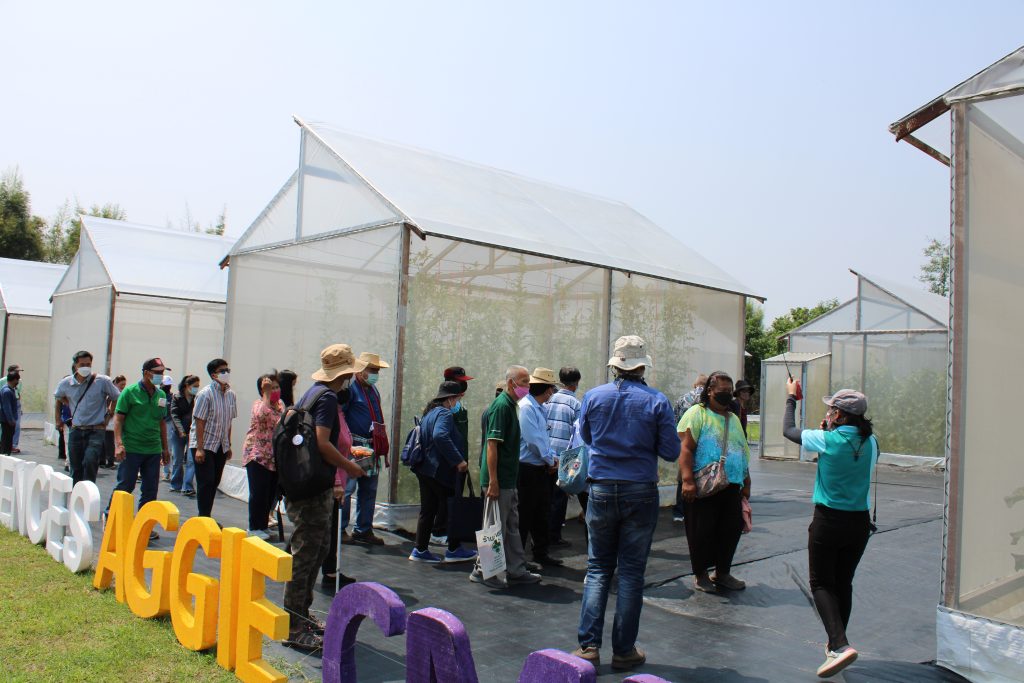Management and utilization of dung from a demonstration pen for the organic cultivation of pesticide-free crops and animal forage
Under the university farm development project for the production of safe food crops following the BCG Economic Model, Year 2

1. Principles and Reasons (In summary)
The University Farm Development Project for the production of safe food crops following the BCG Economic Model, Year 2, has been developed through the collaborative efforts of the Faculty of Agriculture, Nakhon Ping Institute for Research and Energy Development, Science and Technology Park, Faculty of Agricultural Industry, and the Pollution-Free and Safe Food Market Group. The project aims to develop the utilization of space and improve ongoing activities within the area of the demonstration and training center in Mae Hia Research and Training Center to align with the guidelines for economic development in accordance with the BCG Economic Model.
2. Objectives :
- To integrate the activities of various units in line with the development of the utilization of space for research centers, demonstration, and training in agriculture in the Mae Hia Research and Training Center, aligning with the university’s strategies for environmental and energy innovation, as well as innovation in food and health.
- To create and disseminate knowledge in the field of safe agriculture, as well as the sustainable use of resources for a community-centric and environmentally-friendly production system.
3. Target Group :
Demonstration Cattle Farm, Faculty of Agriculture, and Comprehensive Biowaste Management Center, Maejo University.
4. Target Area:
Various organizations in the area of the Mae Hia Research and Training Center for Agriculture.
5. Steps/Process of Operation :
Fiscal Year 2023
- Activity 2: Management of Cow Barns for Biogas Production
- Activity 3: Management of Waste from Cow Barns for Biogas Production.
ปีงบประมาณ 2024
- Activity 2: Management of Biogas Production through Cow Dung Processing
- Activity 3: Waste Management from Cow Barns for Biogas Production
6. Duration of Operation: Year 2523-2524
7. Outputs and Indicators:
KR : 0.2 Percent Carbon Neutral University
8. (OUTCOME) :
1. Objective 1: Economic Values from Innovative Agriculture Practices
The University of Chiang Mai has developed a model area based on the BCG Economic Model that encompasses agricultural production, processing, and consumption activities in a closed-loop agricultural system. This model incorporates the utilization of organic waste, such as food scraps from university cafeterias, to produce natural gas. Additionally, organic waste, including branches and leaves from landscape maintenance on campus, is converted into planting materials and organic fertilizer for crop production. The utilization of cattle dung is also optimized for the production of biogas, which is further utilized in the cultivation of safe vegetables and field crops. Some of the project’s products are expected to be sold to consumers, and certain vegetable outputs will be utilized in university cafeterias, serving as an example of creating economic value within an economic system that revolves around the recycling of biowaste generated from consumption and landscape maintenance activities. This approach helps reduce disposal costs and contributes to environmental conservation by recycling biowaste, reducing greenhouse gas emissions naturally, and enhancing the productivity and efficiency of crop production through the use of suitable planting materials. The knowledge generated from this project can be applied to create a green supply chain in both agricultural production and consumption, promoting sustainability in agriculture.
2. Economic Value in Lifelong Learning Support
Practical training, field trips, marketing management for pesticide-free and safe vegetables by the agricultural group, and project promotion will serve as mediums for the transfer of knowledge arising from the development of various activities following the BCG Economy model within the research, demonstration, and training area of Mae Hia Agricultural Research and Training Center. Examples include pesticide-free vegetable cultivation plots, pesticide-free vegetable production greenhouses, collection plots for local vegetables, safe pesticide-free garden and field crop production, and a comprehensive biowaste management center at Maejo University. These activities aim to foster continuous learning, considering the societal and environmental values, and contribute to the development of agriculture that emphasizes both social and environmental aspects.


